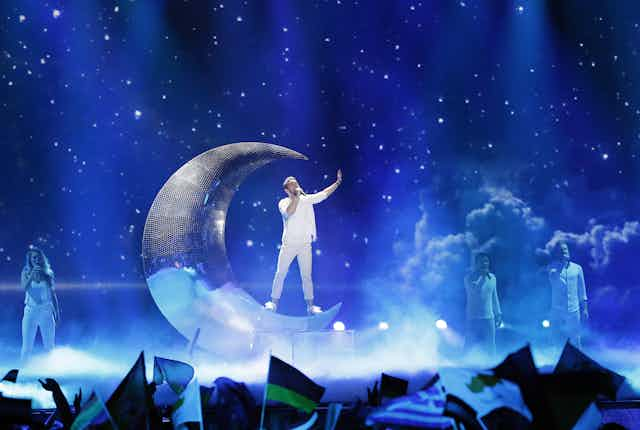Digital Eurovision Song Contest fandom, which takes place across social media platforms, is increasingly becoming a space to discuss LGBT issues. It’s popular because it enables fans to gain access to wider LGBT culture without having to attend more mainstream venues and events. As the contest is not explicitly labelled as a “gay event”, Eurovision digital fandom is providing a more ambiguous platform through which non-heterosexuals can express their sexual identities.
In the build up to the 2018 event in Lisbon, fans have already started conversing over their favourite entries and what they expect from the competition. Transformations in accessing mobile social media now allow fans to interact all year round. In fact, they are increasingly dependent on these mediums to keep in contact with this unique international television phenomenon.
Social media is now used as an entry point for Eurovision-lovers who want a part of the fandom, without having to attend the contest itself. Supporters engage in practices such as “watch alongs” to national finals. These are shows which are used to select a country’s song for the upcoming contest between December and March. Fans watch television channels around Europe and turn to Twitter to share their thoughts with other fans.
Interacting in this way provides feelings of belonging for fans and helps develop digital Eurovision fan culture. One of the most popular television events fans interact with is Sweden’s big production and “mini-Eurovision”, Melodifestivalen – more commonly known as “Melfest”. This competition helped pave the way to ABBA’s victory in 1974 with Waterloo.
Virtual Eurovision culture intersects with wider social media culture. Fans connect with others by developing and sharing creative content using GIFs, memes, video clips and messages. They seek belonging through these methods which bypass the traditionally passive televisual nature of the event.
Fans identify themselves with Eurovision-related names and share their knowledge of the contest through websites, such as Eurovoix, ESC Insight and ESCXTRA. There are many fan sites that cater for different tastes and audiences.
Many of these websites are voluntary. Fans who write for them are now backstage in Lisbon reporting on the rehearsals of this year’s contest. Technology can privilege these fans as they get to meet artists and mix with national media outlets.
The contest creates unity through music and celebrating diversity. This can be embraced, but also contested within fandom. Particularly where individual music tastes can cause friction, as fans become music critics themselves and impose their judgements on others. Eurovision fandom is unique in this regard, as it is a site of celebrating sameness, but also of difference.
Eurovision as a gay event
As Eurovision fandom engages on social media, it intersects with expressions of sexuality. The contest is important in making lesbian, gay, bisexual and transgender identities visible on a global platform. The winner of the 2014 contest, Austrian drag queen Conchita Wurst – “the lady with the beard” – championed gender and sexuality diversity. Conchita also became involved with EU summits and helped promote equal rights for LGBT citizens.
Digital Eurovision fandom facilitates expression of queer sexuality. Fans demonstrate their desires towards Eurovision musicians, but also how they imagine themselves and their sexuality listening to Eurovision-related songs.
Entering into virtual Eurovision fan culture bypasses face-to-face communication and provides a particular level of anonymity. This allows LGBT fans to meet and share experiences about exploring and coming to terms with their sexuality. The contest also reconfigures ideas surrounding sex and sexuality by providing alternative ways into gay culture which don’t necessarily focus on gay identity as just sex and the erotic. Eurovision fandom engages more with the social-cultural side of gay identity and provides an ambiguous platform for these identities to be expressed.
Negotiating a Eurovision closet
Eurovision also enables fans to be themselves. This can be both public declarations of “coming out” of the Eurovision closet as a fan, or fandom can be moderated between particular social media platforms. For some straight men (who are perhaps perceived as a minority within the fandom), they negotiate their fandom between Facebook and Twitter.
Facebook is seen as space to organise everyday social life and connect with close family and friends, whereas Twitter provides opportunities to network and develop Eurovision connections. This is perhaps a consequence of the wider significance of the contest with gay cultures.
The marginality of the contest in some national psyches (such as the UK) may also be a cause for the negotiation of fan identity between social media platforms. In Sweden, for example, the contest is taken much more seriously than it is in the UK. They have a two month artist selection process to select their entry and it is the most watched show in Sweden each year.
Social media can provide a more liberal platform to engage with the contest. This can get beyond negative readings of the contest that are known to prevail in some UK media outlets when it comes to sexuality.
The contest prides itself on embracing identity diversity. It also provides a further entry point into wider LGBT culture – for gay and straight alike – and is not labelled by identity politics. Fans are always excited to meet other fans as they share a mutual interest. The international fan community is a welcoming place.

